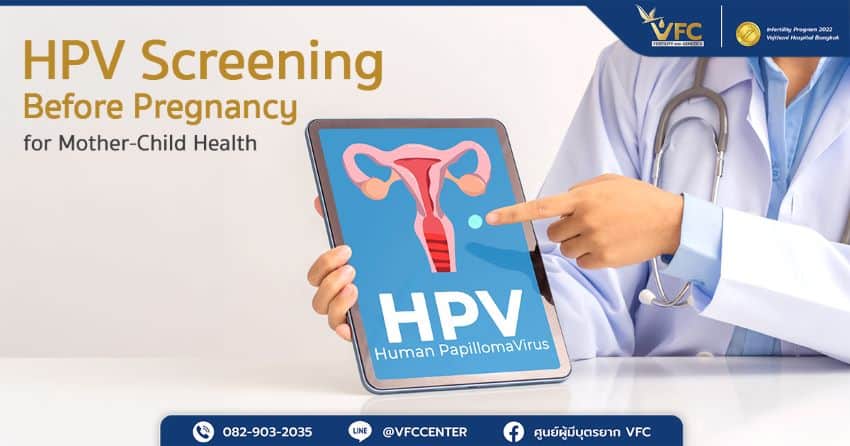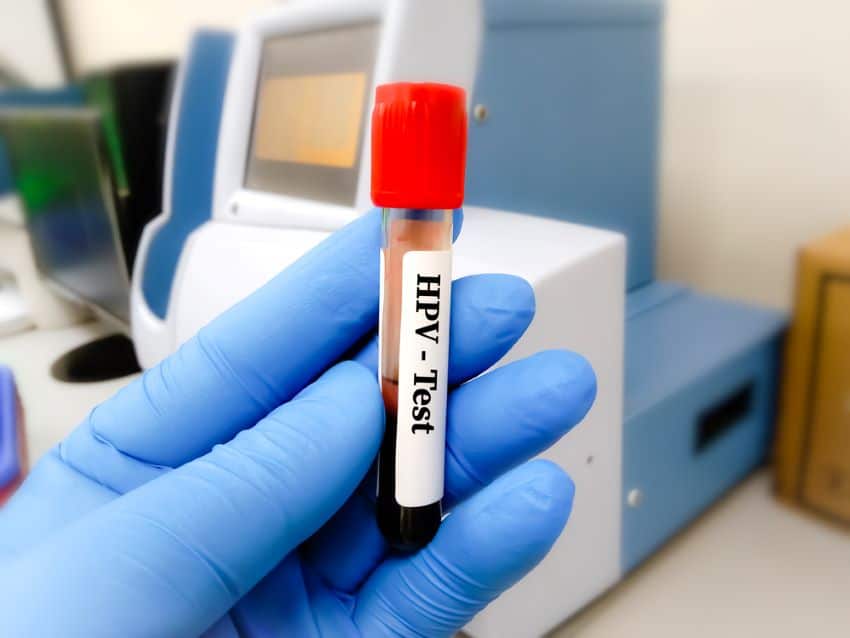
When you’re planning a pregnancy, it’s vital to include a health check for infections that could affect your chances, especially HPV infection. An untreated HPV infection can cause cervical changes and potential pregnancy complications, making screening an essential step in pregnancy planning. This article delves into how HPV affects both mother and baby, what testing methods are used, and why it’s wise to consult a fertility clinic Thailand for comprehensive care. For more on fertility support services, you can explore our page about V-IVF and fertility treatments.
Pregnancy planning doesn’t just mean choosing the right timing, but also preparing your body to be ready for motherhood. Pre-conception health screening is therefore a crucial step that helps ensure your body is prepared for a safe pregnancy and childbirth. One important but often overlooked test is HPV screening, which, if not properly managed, can impact both maternal and fetal health. Therefore, understanding HPV infection is the first step in comprehensive pregnancy planning.
1. What is HPV and How Does It Relate to Pregnancy
1.1 Basic Knowledge About HPV
Human Papillomavirus or HPV is a virus that spreads through skin-to-skin contact, particularly in the genital area. Most infections occur through sexual contact, including vaginal, oral, and anal intercourse, and can occur even without penetration, as the virus can be transmitted through skin contact in the genital area.
Although there are over 200 types of HPV, only about 40 types are related to the reproductive system, which can be divided into 2 main groups based on risk level:
- A Low-risk group that may cause genital warts
- A High-risk group that may lead to abnormal cell changes and increase the risk of cervical cancer
Statistics from research by Pandey et al. (2019) titled “Infectious Diseases in Obstetrics and Gynecology – Human Papillomavirus (HPV) Infection in Early Pregnancy: Prevalence and Implications” in the Journal of Infectious Diseases in Obstetrics and Gynecology show that women of reproductive age (20-35 years) have a high risk of HPV infection, with HPV infection rates in pregnant women reaching 39.4%.
Interestingly, while the body’s immune system can eliminate the virus naturally in most cases within 1-2 years, women with persistent infections may face risks of developing serious diseases later. Therefore, pre-conception health screening is an important opportunity for screening and preventing problems that may occur during pregnancy.
1.2 Effects of HPV on Pregnancy
During pregnancy, hormonal changes and weakened immune systems may cause HPV to persist in the body longer. The effects of this infection may impact pregnancy by increasing the risk of various complications such as preterm labor, premature rupture of membranes, and slower-than-normal fetal growth.
Regarding mother-to-child transmission, although the chance of the baby getting infected from the mother is not very high, it is still possible during delivery through contact with the virus. If infection occurs, the baby may develop a condition called “respiratory papillomatosis,” which can obstruct breathing and requires continuous treatment.
2. Why HPV Testing is Essential Before Pregnancy Planning
2.1 Preventing Complications During Pregnancy
- Avoiding treatments that may affect the baby: HPV testing before pregnancy allows for complete treatment without worrying about effects on the baby, as treatment options become more limited if abnormalities are found during pregnancy, and some methods may not be suitable for pregnant mothers.
- Reducing anxiety and stress during pregnancy: Knowing HPV status in advance gives mothers greater peace of mind during pregnancy. Receiving appropriate monitoring and care helps reduce anxiety that may affect mental health and fetal development.
- Planning appropriate care in advance: Doctors can plan specific care from the beginning, including setting an appropriate prenatal checkup schedule and preparing for the safest possible delivery.
2.2 Opportunities for Appropriate Treatment
- Various treatment options before pregnancy: The pre-pregnancy period offers various treatment options such as cryotherapy, laser treatment, chemical treatment, or minor surgery, allowing doctors and patients to choose the most suitable method without worrying about baby safety.
- Time to monitor treatment results: Pre-pregnancy treatment allows sufficient time to monitor treatment results and ensure treatment success, which typically requires several months to confirm disease resolution.
- Building immunity with vaccines: HPV vaccines can be safely administered before pregnancy to prevent new types of infection. Vaccines help build strong immunity and provide long-term protection, although they cannot treat existing infections.
2.3 Comprehensive Health Care
- Comprehensive reproductive system health screening: HPV testing is part of an overall reproductive system health screening, which includes cervical cancer screening, testing for other sexually transmitted infections, and assessing reproductive system readiness.
Preparing the body for pregnancy: Having complete health information helps optimize physical condition before pregnancy, including nutrition, exercise, and managing various risk factors to ensure a smooth and safe pregnancy.

3. HPV-Related Health Screening
3.1 HPV Testing Methods
There are several methods for HPV testing, with the main widely used method being Pap Smear combined with HPV DNA Test:
- Pap Smear involves collecting cells from the cervix to check for abnormal changes
- HPV DNA Test directly detects HPV virus DNA
For women aged 30 and above, the Centers for Disease Control and Prevention (CDC) recommends both tests together, as persistent infections are more likely at this age and may lead to serious cell changes.
3.2 Interpreting Test Results
HPV test results may show “infection detected” or “no infection detected.” If an infection is found, it will specify the HPV type as high-risk or low-risk. Pap Smear results are graded as normal, mildly abnormal, to severely abnormal.
If test results show abnormalities, doctors may recommend additional tests such as Colposcopy, which uses a special magnifying instrument to examine the cervix in detail, or tissue biopsy for further analysis.
Consulting with a doctor is essential to plan appropriate monitoring or treatment, considering the type of HPV, severity of changes, age, and other risk factors.
4. Self-Care Guidelines During Pregnancy Planning
4.1 Preventing HPV Infection
Practice safe sex using condoms, maintain monogamous relationships, and maintain personal hygiene. Additionally, avoid smoking and excessive alcohol consumption as they may weaken the immune system.
4.2 Preparing Your Body
Eat foods rich in vitamins and minerals, especially fruits and vegetables high in antioxidants. Start taking folic acid at least 1 month before pregnancy, exercise regularly but gently, and get adequate rest.
5. Recommendations for Couples Planning Children
5.1 Joint Health Screening
Although men cannot be directly tested for HPV, understanding infection together is important because men may be carriers without showing symptoms. Open communication about health and annual joint health checkups will make family planning safer.
5.2 Long-term Planning
Set appropriate timing considering health, physical and mental readiness, and personal circumstances. Maintain regular health monitoring as recommended by doctors, as building good health habits is a long-term investment for the family.
HPV testing before pregnancy planning is not just disease prevention, but an investment in the good health of both mother and future baby. Comprehensive health screening and advance preparation will help ensure smooth pregnancy, reducing unnecessary worries and risks. Don’t forget to consult with doctors for advice appropriate to your physical condition, because good health care today is the best gift you can give to your baby and family.
At VFC Center (V Fertility Center), a leading fertility clinic in Thailand, we have a medical team ready to provide comprehensive care, from HPV infection risk assessment and accurate screening tests to planning appropriate fertility treatments for each couple. We believe that a good start leads to a complete family-building journey.
Article by Dr. Nannapat Parosiyanont
Contact or Book a Consultation:
VFC Center – V-Fertility Center
Hotline: 082-903-2035
LINE Official: @vfccenter

The team of specialists in obstetrics and gynecology and reproductive medicine





No Comments
Sorry, the comment form is closed at this time.